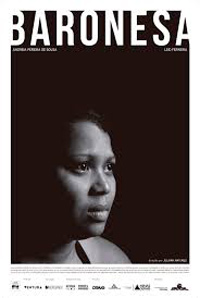Baronesa | 2018 New Horizons Intl. Film Festival Review
A Song for Everyday Life: Antunes Looks at Womanhood in the Favelas
 Set in the favela near Belo Horizonte, Brazil, this feature debut from Juliana Antunes is a one-of-a-kind observational blend of the soothing and the haunting in the lives of a group of women trying to carve a future for themselves. Baronesa unfolds through a series of sketches and conversations involving real people – the result of Antunes’ prolonged immersion in the community, and subsequent incorporation of reality into a fluid, hybrid script.
Set in the favela near Belo Horizonte, Brazil, this feature debut from Juliana Antunes is a one-of-a-kind observational blend of the soothing and the haunting in the lives of a group of women trying to carve a future for themselves. Baronesa unfolds through a series of sketches and conversations involving real people – the result of Antunes’ prolonged immersion in the community, and subsequent incorporation of reality into a fluid, hybrid script.
Characters come and go, but the two mainstays are Andreia and Leid, two neighbors working alongside one another in a common courtyard. Andreia is a stylist and all-around life coach to the women in the neighborhood, while Leid takes care of other people’s kids while she waits for her husband to get out of jail. Day after day, the two find each other outside and talk at length, or welcome others into their houses. Slowly and deliberately, Antunes introduces – at first only through allusion – the notion of a drug war between rival gangs looming. This is perhaps the direction most viewers would expect the film to take, in some form or another, but Antunes’ great achievement is keeping it – along with some other predictable elements of life in the favelas – firmly in the background, thus allowing the more spontaneous, universal truth of the moment to surface at its own pace.
The result is a surprisingly nuanced and complex portrayal of womanhood, focusing particularly on bodies and intimacy. The sharing is honest and kind between these women, and always life-affirming even in the face of, and indeed because of, the social and financial circumstances limiting their power of choice. The awareness of the self therefore comes through a certain freewheeling anecdotal energy, with stories of masturbation, love, marriage and the difficulty of smuggling stuff through x-ray scans at the airport. Andreia is the most influential in this context, and she uses her position to impart wisdom on young brides and inexperienced teenagers while she does their nails.
Antunes, who was also Assistant Director on another well-received Brazilian film from last year, Araby (whose co-director Affonso Uchoa, in turn, helped cut down the raw Baronesa footage to a more manageable size, and is here credited as one of the editors), has assembled a remarkable feature debut with a distinctive political voice and a clever use of documentary technique. Far from being just a series of re-enacted conversations, Baronesa is noteworthy for the care with which Antunes (who is originally from the Belo Horizonte area) and her DP Fernanda de Sena set up these placid everyday encounters, static affairs that let the props and the objects tell the story. The brick walls, the street outside, a makeshift barrel bathtub, even the brush of nail polish that Andreia uses on the bottom of her bottles to label them; the favela around these women is evoked through signifiers, subversively deconstructed and rebuilt by a new narrative.
That is, of course, until the war eventually comes – Andreia has long had a plan for that, looking to move to the semi-idealized place that gives the film its title, Baronesa. Her desire to build a house there is planted early on, and satisfyingly paid off in the end, but there’s nothing condescending or consolatory about it. An act of mourning performed via the hanging of black plastic ribbons to electric poles is the only oblique response to the oblique framing of a very urgent danger.
Reviewed on July 29th at the 2018 New Horizons Intl. Film Fest. 71 mins.
★★★½/☆☆☆☆☆
A freelance film critic and programmer, Tommaso Tocci is based between Paris and Rome. He covers the European festival circuit and he's a member of FIPRESCI and the International Cinephile Society. His Top 3 for 2021: After Blue (Bertrand Mandico), Titane (Julia Ducournau), What Do We See When We Look at the Sky? (Alexandre Koberidze).
























